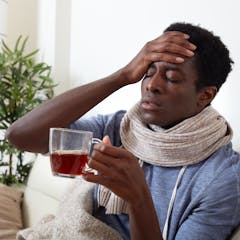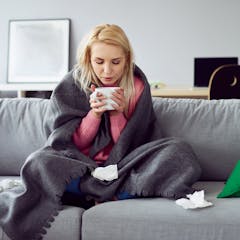
Articles on Flu
Displaying 1 - 20 of 151 articles

‘Natural’ isn’t the same thing as healthful. You can have too much of a good thing, and taking action can be worse than doing nothing.

Research shows that rapid antigen tests are performing as well at detecting the most recent dominant variants as they did with the earliest strains in the COVID-19 pandemic.

The current triple epidemic of respiratory viruses is affecting all age groups, prompting comparisons with the pre-COVID-19 era.

Research suggests we should embrace feeling down when ill.

This is expected to be the smallest Omicron wave so far. But eligible older and vulnerable people are still recommended to have a booster.

Knowing what’s causing your symptoms is important for choosing the right treatment.

Grandma swore by it. Now science weighs in on the healing powers of chicken soup.

Newly approved and updated vaccines are the best tools available to combat COVID-19, the flu and RSV, as infections and hospitalizations tick upward and cold and flu season gets underway.

Despite an abundance of research on strep, there is still a great deal of debate in the scientific community over whether and when people should get tested and treated for it.

Rates of flu vaccination are down for children. That leaves them and us vulnerable to the flu and its complications.

Flu vaccines remain the most effective method available to prevent flu illness, especially severe illness.

To combat the decline in immunity as we age, specific boosters are available for people aged over 65. Here’s how they work, and why they are needed.

As people flock back to offices and pack public transport, we’re seeing more cases of the flu than in recent years. The flu shot isn’t perfect but it cuts your chance of being hospitalised.

Knowing if you have COVID or the flu can affect when you get vaccinated, need a particular antiviral, or if you need to work from home. But these combination tests can be expensive.

Some of the prescription medications you’re taking may not mix with over-the-counter drugs.

Similar to the patterns seen with COVID-19, flu and RSV, HMPV is making a comeback after years of being repressed by people wearing masks and social distancing.

A combination of high demand and poor stock planning may explain current problems.

Here are some simple things you can do everyday to help your immune system fight off infections.

Evidence-based tools for dialectical behaviour therapy can help us manage family stressors during the virulent respiratory virus season.

There are many things you can do to help your pet when they’re sick.
